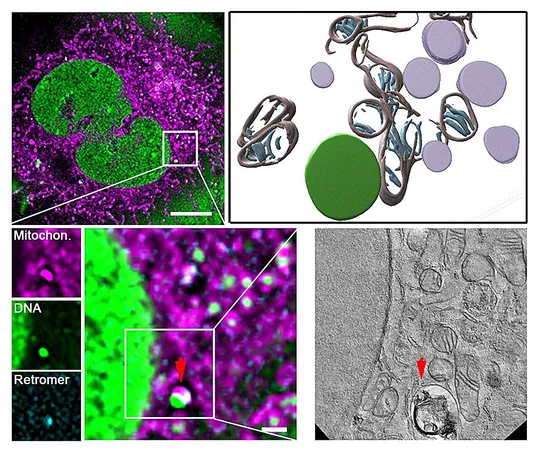
Revolutionary Discovery: Scientists Break Ground in Organic Spintronics with Multilevel Magnetoresistance!
2025-01-15
Author: John Tan
Groundbreaking Advancement in Organic Spintronics
In a groundbreaking study published in Advanced Materials, a team of researchers has unveiled a significant advancement in the realm of organic spintronic devices, achieving multilevel spin-based modulation of magnetoresistance in high-performance organic spin valve (OSV) devices. This new technology could revolutionize information storage and processing by leveraging the inherent advantages of organic materials.
Benefits of Organic Spintronic Devices
Organic spintronics is an exciting new branch of the field that marries the flexibility of organic molecules with innovative spin modulation mechanisms. Some of the standout benefits of these devices include their low production costs, lightweight nature, flexibility, and the ability to be processed from solutions—all traits that make them ideal candidates for future technological applications.
Overcoming Limitations in Organic Spintronics
Despite their promise, previous limitations have affected the performance of organic spintronic devices, particularly the relatively narrow range of tunable magnetoresistance. This shortfall has stymied both theoretical advancement and real-world applications, making the recent development all the more significant.
Innovative Device Design by Research Team
Led by Professor Shen Baogen of the Ningbo Institute of Materials Technology and Engineering (NIMTE) at the Chinese Academy of Sciences, the research team has introduced an innovative three-terminal OSV device for the first time. This device incorporates a gate structure that combines strain electronics with organic spintronics, elevating its performance.
Remarkable Results Achieved
The results are remarkable, with the device achieving a magnetoresistance value of 281%—a staggering tenfold improvement compared to traditional polymer systems. This new architecture separates the writing and reading units, a departure from conventional design that ensures that signal integrity is maintained without risking device failure.
Multi-state Modulation Capability
By harnessing strain control alongside spin-polarized current control, the researchers have demonstrated a multi-state modulation capability, successfully establishing at least ten stable spin-dependent working states within a single device. This breakthrough is poised to dramatically enhance the storage density of organic spintronic devices.
Synergistic Effects and Future Applications
The extended modulation range is primarily attributed to the synergistic effects of strain and charge accumulation, a phenomenon amplified by what researchers have termed "spinterface." This novel interaction opens exciting new avenues for future research and applications, potentially unlocking unprecedented levels of efficiency and performance in organic spintronic devices.



 Brasil (PT)
Brasil (PT)
 Canada (EN)
Canada (EN)
 Chile (ES)
Chile (ES)
 Česko (CS)
Česko (CS)
 대한민국 (KO)
대한민국 (KO)
 España (ES)
España (ES)
 France (FR)
France (FR)
 Hong Kong (EN)
Hong Kong (EN)
 Italia (IT)
Italia (IT)
 日本 (JA)
日本 (JA)
 Magyarország (HU)
Magyarország (HU)
 Norge (NO)
Norge (NO)
 Polska (PL)
Polska (PL)
 Schweiz (DE)
Schweiz (DE)
 Singapore (EN)
Singapore (EN)
 Sverige (SV)
Sverige (SV)
 Suomi (FI)
Suomi (FI)
 Türkiye (TR)
Türkiye (TR)
 الإمارات العربية المتحدة (AR)
الإمارات العربية المتحدة (AR)